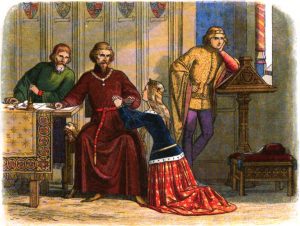
The Merciless Parliament, convened in Feb 1388, was a successful attempt by the barons and the commons to clean house, so to speak, and bring the king totally under their control. It was very much an “us versus them” scenario, and Richard II did not have the resources to fight the powerful nobles backed by large, private armies, and London, too. In Part 2 we saw the dissipation of Richard’s only royal force at Radcot Bridge, and his subsequent humiliation at the hands of the Appellants. By the time Parliament met, he was lucky to still be wearing his crown, and he had no means to resist any of the terrible condemnations against his friends and supporters.
At the beginning, Parliament declared against the five defendants, four in absentia. Robert de Vere, Earl of Oxford had scooted out of the country after the fiasco at Radcot Bridge. Michael de La Pole and Alexander Neville, Archbishop of York had slipped away even before de Vere marched east with his army. Chief Justice Robert Tresilian had disappeared, but Nicholas Brembre, a powerful London Vintner, stood his ground for he was a brave man and the case against him was weak. Since he was the only defendant present Parliament gave it their worst, but his defense was strong and it was beginning to look like he might be dismissed.
Alas, as the prosecution was beginning to falter, someone ran into the courtroom and declared that they had just discovered the missing Tresilian right there in Westminster. The room emptied out as the vengeful prosecutors chased down the Chief Justice and, because he had been condemned in absentia, he was dragged on a hurdle to Tyburn gallows and hanged on the spot. By the time Parliament went back to their case against Nicholas Brembre, apparently his defenders lost heart and he, too was condemned to death.
But it wasn’t over for King Richard; they were just warming up. The Appellants’ goal was the complete removal of Richard’s “bad counselors”—from his chamber knights down to the household clerks. Firstly, John Blake, the sergeant who drafted the questions to the judges (see Part 2) and Thomas Usk, under-sheriff were condemned and executed; their charges were not noted in the record. The judges themselves were quickly condemned, as well as the king’s confessor, the Bishop of Chichester. The commons wanted to execute them, but the other Bishops intervened and they were exiled to Ireland instead.
The fate of Richard’s chamber knights was not so simple, for there was much division among the Lords and even between the Appellants themselves. It took over a month before all were condemned and executed. Sir Simon Burley, Richard’s vice-Chamberlain, was the king’s tutor from childhood and an old comrade-in-arms of The Black Prince. Henry of Bolingbroke and Thomas de Mowbray fought bitterly to save his life; the Duke of York quarreled with his brother in open Parliament; even Queen Anne went down on her knees and begged Gloucester to spare Burley—reportedly for three hours. The best response she got was to pray for both herself and her husband. According to Knighton (Chronicles, Vol. II pp.266-70), a petition from the men of Kent threatening a popular uprising and demanding Burley’s execution (he was Constable of Dover) intimidated his supporters into dropping their plea for mercy. In the end, Burley was condemned but allowed the axe instead of a traitor’s death. He was soon followed to the block by Sir John Beauchamp of Holt, the king’s Steward, and Sir James Berners; they were accused of suborning young Richard and encouraging him to conspire against the Appellants. Sir John Salesbury was accused of conspiring with France and was drawn and hung.
Having achieved their major objectives, the Appellants were content to release the remaining lesser knights and clerks under the surety of good behavior. Richard’s household was cut in size by almost half, and yet another committee was appointed to oversee the king’s personal affairs. The Appellants continued to govern under dubious authority, and as events were to prove, their performance was lackluster. Oh, and they were granted the phenomenal sum of £20,000 “for their great expenses in procuring the salvation of the realm and the destruction of the traitors.”
As viewed by many historians, all this legal skulduggery exposed the Appellants as “desperate men… handicapped by the weakness of their own cause” (Harold F. Hutchison, The Hollow Crown p.117). In other words, the Appellants tried to prove the validity of their proceedings by consulting their own lawyers and were told “that it was illegal both by civil law and by the law of the land” (Anthony Steel, Richard II p.150). So, instead, they declared that their appeal could be dealt with “by the Law of Parliament”, which superseded all Civil and Common Law. This was totally without precedent and created many problems, for as Steel said, because of the “absence of any known rules when difficulties arose, no one knew what to do when there was a hitch in the proceedings, because all laws had been thrown overboard.” Because this new Law of Parliament was so irregular, the Appellants attempted to ensure that it would not set a precedent (they didn’t want to find themselves on the receiving end), and yet that no future Parliament would be able to reverse their decision. In other words, they wanted to have it both ways. Good try. It would take Richard ten years to accomplish his revenge, but in the end he used many of their devices against them.
One thought on “The Lords Appellant Part 3: The Merciless Parliament”